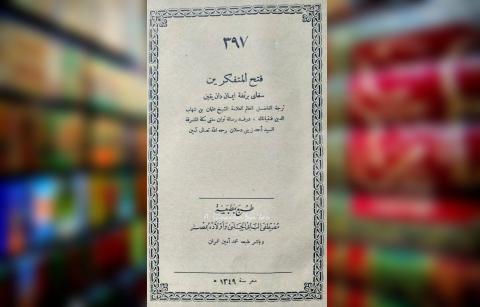Sketching out the relationship between Islam and the state
NU Online · Selasa, 24 Februari 2009 | 06:25 WIB
Author : Dr. Mujiburrahman
Publisher : Pustaka Pelajar, Yogyakarta
Edition : I, December 2008
Volume : 438 pages
Reviewer : Puji Hartanto
All ideas of the book entitled Indonesianizing Islam and written by Mujiburrahman explain that Muslims as a majority in the multi-religious,
multi-ethnic and multi-ideological country are in need of the importance of grasping Islamic teachings. All this is intended to endorse the spirit of creating and cultivating the unity of all Indonesians that have now faced possibly threatening disintegration. Mujiburrahman, indeed, tries to remind us that such pluralistic realities in regard with Islam politics in Indonesia should wholeheartedly be accepted especially in terms of the fact that Islamic teachings including politics are full of various interpretations.
This situation is of course very difficult because we are forced to take one of the two options that should ideally be taken jointly. But, that is the scene of our ideological-political reality having emerged since the birth of the nation of ours. Based on the poor condition, what comes to our minds is our irrational political attitude and stance. The most strikingly feature is our ideological decision to treat religion as such a subordinative institution toward the state. In this case, it is interesting to consider what ever said by Ruslani (2004) that the state and politics should be used as instrument rather than compulsory to set upon ideal state so-called as Islamic state. He was of the opinion that the main teaching of all intended within Islam is taqwa. In this regard, government or the state is realized to create space and time as place for every human to be able to develop their taqwa.
In Islam, the problems as described earlier may be categorized in ethical matters. What is to say is democratic attitudes will emerge if ethics inspired from observance and tauhid are followed. That is why any ideological decision emerges because Islam is still considered as a subordinate to the state. At this point, Islam as a belief system we understand, believe, and even use to handle the state is Islam not to do with the state at all, namely personal-individual Islam and possibly household-oriented Islam. While public Islam, in this respect Islam as moral and ethical basis has been put aside. Instead, if we focus more on such views inspired from public Islam, any difficulty in dealing with the relationship between Islam and the state can easily be handled.
In terms of the second issue, namely Islam as discourse and movement, the writer argues that in the reform era, the internal problem facing Muslims is first of all that related to pluralism. It is interesting to note that pluralism here is not such a theological pluralism as declared haram (forbidden) by the Indonesian Ulema Council (MUI) in 2005, saying all religions were the same and could bring salvation. Pluralism here is, however, understood as a positive attitude toward diversity and keeping up true efforts in managing diversity peacefully and fairly (page xv).
Mujiburrahman reminds us that in studying Islamic discourse and movements overwhelmingly emerging in public space, what is very important to examine is we can trace where are the discourse and the movements from. Why? Because the discourse and the movements can not be separated from various Islamic movements having widely emerged. For example, such mainstream Islamic organizations as Nahdlatul Ulama (NU) and Muhammadiyah have some of the time offered certain Islamic movements strikingly different than any other Islamic groups such as Hizbut Tahrir, Islamic Defender Front (FPI), Majelis Mujahidin and so forth. Similarly with such Islamic student movements as Muslim Students Association (HMI), Indonesian Muslim Students Movement (PMII), Indonesian Muslim Students’ Action Union (KAMMI) and so on, they can promote different discourses in open discussions and in the form of staging street protest.
By understanding the origin of the Islamic discourse and movements emerging in the public space, we will also understand that the public space in which various Islamic movements and many other groups have emerged can be a power capable of making our nation's democracy mature (page 60). At this point it is understandable if within a discourse or movement from a certain Islamic group, there are interests and goals that must be pursued. But it will be a problem when there are some using bad strategies and intrigues for attaining their own group's interest. As a consequence, universal aims like developing a democratic, just society to meet shared interest can not be realized.
That is why in-depth studies on Islamic discourse and movements are also expectedly intended to deal with any obstacle as well as chances upon the possibility of finding a joint consensus about certain public issues related especially to religion peacefully and fairly based on mutual understanding, acceptance and even cooperation without claiming truth of his or her theological beliefs.
The reviewer is book lover and much concerned about social religious issues.
Terpopuler
1
Khutbah Jumat: Ramadhan dan Kesempatan yang Tidak Selalu Terulang
2
Keluar Mani yang Tidak dan Membatalkan Puasa
3
Khutbah Jumat: Ramadhan, Melatih Sabar, Memperkuat Syukur
4
Khutbah Jumat: Tiga Kebahagiaan Orang Puasa
5
Kultum Ramadhan: Keutamaan Tarawih dan Witir
6
Khutbah Jumat: 4 Cara Menghidupkan Malam Ramadhan dengan Ibadah
Terkini
Lihat Semua















